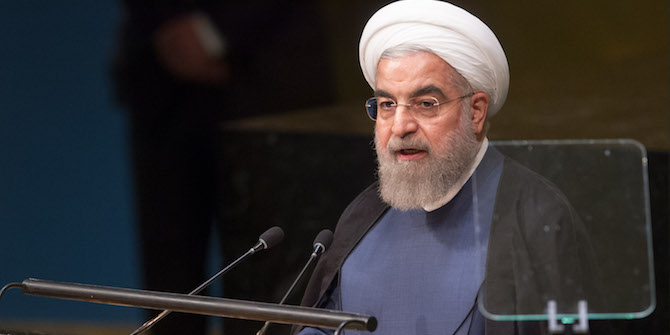by Shabnam Holliday

Recent years have seen a surge in the prevalence of populist politics globally. While there is considerable debate regarding what populism is, it is generally agreed that populists pitch ‘the people’ against ‘the elite’. Populists portray themselves as speaking for ‘the people’. Much of the scholarship focuses on how and why populism develops in a domestic political context, that is, within a state. While this is very important, so too is the impact of populism on international politics, including on the relationship between states and the way in which we understand the world. For instance, the language populist leaders, governments and parties use also gives us an indication about how they see global order.
A conception of global order includes a set of values that govern how states, among others, should deal with each other in the practice of global politics. For some, such as G. John Ikenberry, the last seven decades have been dominated by a ‘western liberal order’, that is, the order imposed and conceived of by the US and its allies. Values typically associated with this include democracy and the rule of law. However, for Amitav Acharya, the ‘American World Order was for the most part not really a global order’ and the ‘liberal hegemonic order narrative tends to downplay regional forces or present them as a threat’. Therefore, as Acharya argues, it is necessary to recognise different constructions of global order. Consequently, when we think about global order, it is important to remember that all states take part in defining such a system, because after all, all are part of the globe and therefore, global politics.
The election of US President Donald Trump is part of this global populist trend. Furthermore, with Trump’s election, the relationship between the US, Israel and Iran has returned to the limelight. Importantly, not only is Trump a populist leader, but Israel’s Prime Minister Benjamin Netanyahu and the Iranian government are also considered populist. For Trump, Iran is a ‘rogue regime’, a ‘threat’, and a destabilising, destructive force fuelling sectarian violence in the region, which therefore needs to be isolated. Following repeated criticisms of the Joint Comprehensive Plan of Action (JCPOA, or ‘Iran nuclear deal’), on 8 May 2018, Trump announced the US withdrawal from the JCPOA, referring to Iran as ‘the leading state sponsor of terror’. A week later, the new American embassy was opened in Jerusalem following Trump’s recognition of the city as Israel’s capital.
If we are to better understand global populism, in addition to international politics, it is essential to also explore and better understand states and governments that are often viewed as ‘rogue’ or as a ‘threat’. To do this, it is necessary to see how they see their relationship with the rest of the world; for instance, how does the Islamic Republic of Iran see itself in relation to the international community? An analysis that focuses on how some Islamic Republic elites see Iran in relation to the international system shows that populism is integral to this understanding of global order.
For example, an analysis of President Hassan Rouhani’s populism shows how simultaneously, there is the need to maintain the Islamic Republic’s legitimacy and populist credentials both inside and outside Iran; delegitimise Israel; and construct a global order in terms of the ‘oppressor’ versus the ‘oppressed’. This is done by equating the Islamic Republic not only with the Iranian ‘people’, but also with a ‘people’ outside its borders, the Palestinians. This is articulated in opposition to Israel, which is constructed as not being of ‘the people’ because of its occupation of Palestine. For example, in Rouhani’s 2013 NBC interview he defined Iran’s government as ‘democratically elected’ through ‘free votes of the people’. He also associated Iran with the Palestinian people. Israel, however, was portrayed by Rouhani as an ‘occupier’ and ‘warmongering’.
Following Trump’s withdrawal from the JCPOA and his recognition of Jerusalem as Israel’s capital, Rouhani’s narrative sought to establish Iran as law abiding, with Israel and the US regarded as renegades outside the strictures of international law regarding the status of Jerusalem and the JCPOA. This is part of a wider view of the world that sees it as divided into two camps. One camp consists of the oppressed, ‘the people’ and the Islamic Republic as the defender of ‘the people’. The other is the oppressors, including the ‘elite’, Israel, and of course the US. Thus, in Iran’s view of global order, far from a ‘threat’ or rogue regime, the country is seen rather as the ‘champion of the people’.
In terms of our wider understanding of populism, our interrogation of it requires us to reflect upon its global nature. Failing to do so not only impedes a better understanding of populism, whenever and wherever it is manifested, but also can lead to a failure to identify similarities and relationships between populisms in different places.
Dr Holliday’s full article has been published in Political Studies, available here: https://doi.org/10.1177/0032321718817476
 Shabnam Holliday is a Lecturer in International Relations at the University of Plymouth and the Director of the Modern Research Project, British Institute of Persian Studies. Her publications include ‘The Legacy of Subalternity and Gramsci’s National-Popular: Populist Discourse in the Case of the Islamic Republic of Iran’, Third World Quarterly (2016); Political Identities and Popular Uprisings in the Middle East with Philip Leech (eds); and Defining Iran: Politics of Resistance. She tweets at @ShabnamHolliday
Shabnam Holliday is a Lecturer in International Relations at the University of Plymouth and the Director of the Modern Research Project, British Institute of Persian Studies. Her publications include ‘The Legacy of Subalternity and Gramsci’s National-Popular: Populist Discourse in the Case of the Islamic Republic of Iran’, Third World Quarterly (2016); Political Identities and Popular Uprisings in the Middle East with Philip Leech (eds); and Defining Iran: Politics of Resistance. She tweets at @ShabnamHolliday






